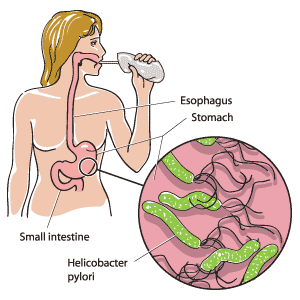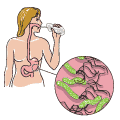Description of the test
Helicobacter pylori (also known as H. pylori) is a type of bacterium that is known to cause most stomach ulcers (i.e., sores in the stomach or intestinal lining). However, not everyone who has this bacterium in the body develops an ulcer.
This test uses a chemical reaction to detect the H. pylori bacteria. The test contains a chemical called urea, which is attached to a carbon atom. The bacteria break down the urea thereby releasing the carbon, which is eventually exhaled in the breath. The breath is then tested to check for the carbon.
How often should the test be performed?
Your doctor will recommend when and how frequently this test is required.
Why is this test performed?
People experiencing possible ulcer symptoms require treatment to relieve these symptoms and prevent any complications related to ulcers. This test helps doctors determine if H. pylori is causing an ulcer or stomach lining irritation.
It is important for doctors to know the cause of the ulcer, as this affects the treatment they will recommend.
Doctors also request this test to determine if the treatment for an H. pylori infection has been successful. In this case, the test is normally done at least 4 weeks after completing an antibiotic treatment.
Are there any risks and precautions?
There is very low risk of side effects or complications with this test.
There are two types of H. pylori breath test: one uses a 14C carbon atom, and the other uses a 13C carbon atom.
The 14C urea breath test involves swallowing a tablet containing a small dose of radiation. The amount of radiation you take for the test is less than the amount of radiation you receive outdoors in a day (or, about a quarter of what you would receive with a chest X-ray). This test is not recommended if you are or may be pregnant, or if you are breast-feeding. Because of the radiation involved, children should not have this test.
The 13C urea breath test is not radioactive and is not harmful in any way. It can be used by children and pregnant women, but is more expensive and not available in all areas.
What happens during the test?
The test takes approximately 20 to 30 minutes to complete.
- The first step is to take a sample of your breath by blowing into a balloon or another container.
- Next, you will swallow either a drink or a capsule that contains urea attached to a carbon atom. You may also be given a citric acid drink (such as orange juice).
- A technician will take more samples of your breath at different times. The samples are sent to the laboratory for analysis.
How should I prepare for this test?
Avoid eating or drinking for 6 hours before the test.
Certain medications can interfere with the test results and should be avoided before the test. These include antibiotics, ulcer medications, and heartburn relievers (including over-the-counter products).
The test results will be inaccurate if you are taking (most) antibiotics or medications that reduce stomach acid. Normally, your doctor will ask you to stop taking these medications anywhere between 1 day to 4 weeks before the test, depending on the medication.
Tell your doctor or prescriber about all prescription, over-the-counter (non-prescription), and herbal medications that you are taking. Also tell them about any medication allergies and medical conditions that you may have.
Ask your doctor or pharmacist whether you need to stop taking any of your medications before the test.
What can I expect after the test?
After the test, you can return to your usual activities.
Results
Lab technicians use a special machine to analyze your breath samples. Finding higher levels of carbon in the samples from after you swallowed the capsule or drink shows that H. pylori bacteria are present in your stomach. Your doctor with receive the results from the laboratory.
Ask your doctor when you can expect your test results to be made available.
All material copyright MediResource Inc. 1996 – 2024. Terms and conditions of use. The contents herein are for informational purposes only. Always seek the advice of your physician or other qualified health provider with any questions you may have regarding a medical condition. Source: www.medbroadcast.com/procedure/getprocedure/Helicobacter-Pylori-Urea-Breath-Test

A person performing a H. pylori urea breath test. The inset shows what the H. pylori bacteria look like.






